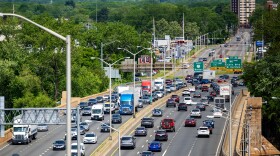Do you worry about how you’re everyday actions contribute to climate change? You may think about the carbon gas-burning cars are putting into the atmosphere, or coal-powered electricity in your houses.
But what about the food you eat?
This hour we talk about the role of the livestock industry on putting carbon into the atmosphere. Are our carnivorous habits contributing to the climate crisis?
We talk with the UN’s Food and Agriculture Organization about how the meat industry worldwide can reduce its carbon footprint. And we hear from a Connecticut beef cattle farmer about an innovative type of grazing that may reduce the environmental impact of raising cattle.
And how should we as consumers here in Connecticut think about lessening the carbon footprint of our dinner plates...especially if going full-on vegan is not on the table?
Join the conversation on Facebook and Twitter.
GUESTS:
- Dr. Anne Mottet - Livestock expert at the UN Food and Agriculture Organization (FAO) (@Anne_Mottet)
- Dr. Joe Orifice - Connecticut beef farmer & owner and operator of “Hidden Blossoms Farm” in Union, CT. He’s also the Director of Forest and Agriculture Operations at Yale School of Forestry
- Allison Johnson - Sustainable Food Policy Advocate with the Natural Resource Defense Council (NRDC)
READING LIST
New York Times: The Meat Question, by the Numbers (January 2018)- “Worldwide, livestock accounts for between 14.5 percent and 18 percent of human-induced greenhouse gas emissions. The percentage is lower in the United States in part because our overall greenhouse gas emissions are so much higher than other countries”
FAO: Tackling climate change through livestock: A global assessment of emissions and mitigation opportunities (2013) – “With emissions estimated at 7.1 gigatonnes CO2 -eq per annum, representing 14.5 percent of human-induced GHG emissions, the livestock sector plays an important role in climate change. Beef and cattle milk production account for the majority of emissions, respectively contributing 41 and 20 percent of the sector’s emissions. While pig meat and poultry meat and eggs contribute respectively 9 percent and 8 percent to the sector’s emissions. The strong projected growth of this production will result in higher emission shares and volumes over time.”
Washington Post: How we can make beef less terrible for the environment (May 2018)– “Though little known to the public, silvopasture is currently practiced on an estimated 15 percent of the world’s grazing land. Yet scarcely a word about the method is found in key climate change documents and agreements. When it is mentioned, it is lumped in with other “agroforestry” practices that integrate trees with crops and sometimes livestock. Cropland agroforestry has recently been shown to have a much greater climate impact than previously believed.”
Chion Wolf contributed to this show, which originally aired on October 5, 2018.






